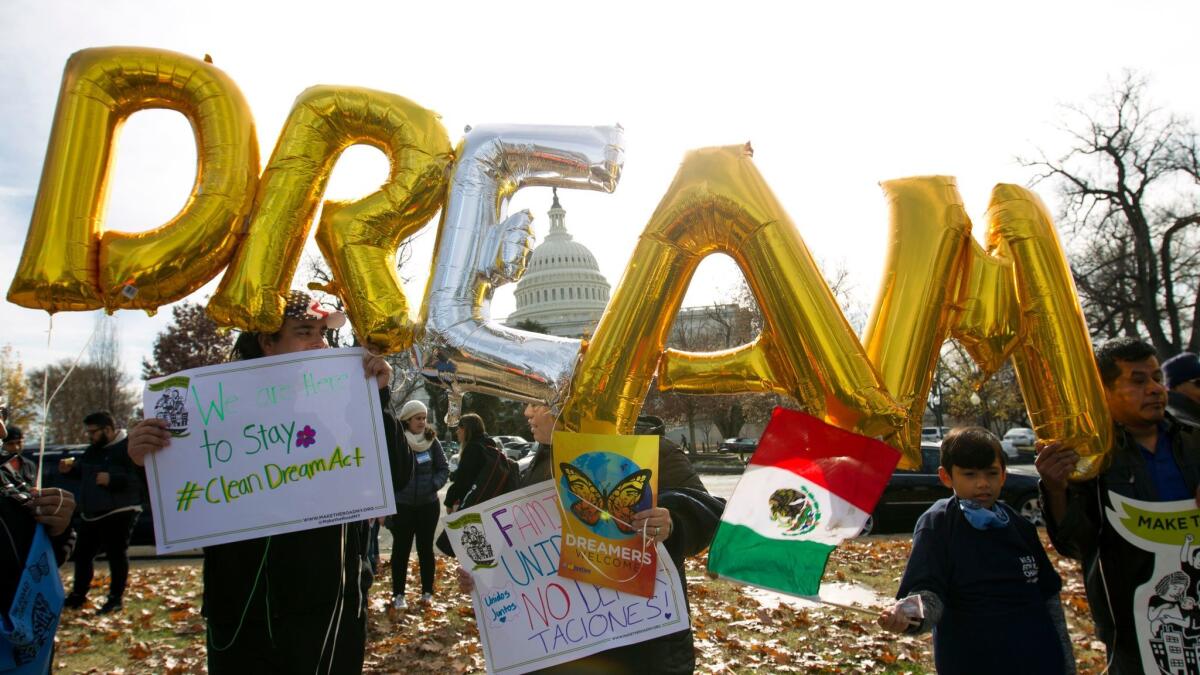Newsletter: The DACA ‘crisis’ is all Trump’s fault. Really

Good morning. I’m Paul Thornton, and it is Saturday, Feb. 10, 2018. Did you forget to watch Day 3 of the Olympic curling tournament? Let’s take a look back at the week in Opinion.
Lost in the debate over the most recent (and arguably most pointless ever) government shutdown, the federal budget and what to do with the roughly 700,000 people protected from deportation under the Deferred Action for Childhood Arrivals, is sight of the fact that a single person is largely responsible for this mess: President Trump.
It was Trump, after all, who decided last year to strip DACA protection from hundreds of thousands of Americans who arrived in this country illegally as minors, a reckless action that has little public support and created an unnecessary crisis. This prompted Democrats to demand a DACA fix as a condition of supporting any budget resolution to keep the government open, leading to not one but two brief shutdowns.
Editorial writer Scott Martelle reminds us of the president’s sole responsibility for this mayhem:
A large majority of Americans, including Republicans, recognize that the Dreamers are in an immigration bind of their parents’ making, and that it would be unfair and inhumane to kick them out of the country in which they were raised. The vast majority of the Dreamers are law-abiding, productive members of society, and their ranks include doctors, priests and teachers as well as police, firefighters, and paramedics.
What possible public benefit comes from kicking these people out of the country now? In fact, ending DACA and withdrawing permission for the Dreamers to work could cost the economy from $200 billion to more than $400 billion, depending on whose estimate you buy.
As The Times’ editorial board has pointed out, this problem is fixable. But it has become a crisis for two reasons: Trump blew up the status quo by ending DACA, and Republican congressional leaders refuse to move a clean bill to resolve the Dreamers’ status.
Instead, they — following Trump’s lead — are using the Dreamers to push an immigration agenda that does not have enough political support to get through on its own.
Compromise is, indeed, the heart of the democratic process. But this isn’t an exercise in horse-trading — you give us X, we’ll give you Y — as much as it is a hostage-taking of the Dreamers.
Trump isn’t the new Richard Nixon — he’s much worse. David Rothkopf offers this damning assessment of Trump vis a vis Nixon and Watergate: “Nixon was an experienced politician and in many respects an effective president. Trump, despite majorities in both houses of Congress, has gotten precious little done and in some areas — such as environmental, immigration, trade and foreign policy — he has been a disaster. Above and beyond this, however, he manages to constantly debase the office daily in ways Nixon, for all his flaws, would never have dreamed of doing.” L.A. Times
Don’t make child welfare legislation based on the Turpin family. Hard cases make bad law, as the saying goes, and the terrifying trauma endured by David and Louise Turpin’s 13 children already is spawning efforts to change how we deal with child abuse. As Naomi Schaefer Riley notes, the fact that no one over many years notified authorities that something might be amiss in the Turpin household makes this unlike any case of child abuse or neglect — and it’s precisely why lawmakers should hold off responding to it legislatively. L.A. Times
This newsletter will soon come from a locally owned source. You might have heard that L.A.’s wealthiest person, Dr. Patrick Soon-Shiong, agreed Wednesday to buy the Los Angeles Times. Media analyst Ken Doctor considers all the ways Soon-Shiong’s ownership could (as in, could) benefit The Times and Southern California, the Washington Post dives into his record as an entrepreneur in medicine, KPCC rounds up some of the reaction by noteworthy locals, and the New York Times leads its report with a spurious comment on L.A. and rich celebrities.
“Food deserts” aren’t the reason why poor Americans eat unhealthful food. Rather, writes sociologist Priya Fielding-Singh, it’s the fact that for poor families, junk food is the only indulgence they can afford — meaning that when a financially comfortable parent tells his or her child “no” to a treat, it means a lot less than it would for a kid whose only relief comes in the form of a cheap candy bar or a can of soda. L.A. Times
American guns are killing people in Mexico, so when the president blames our southern neighbor for making us less safe, he has it exactly backward. “This tsunami of guns leaving the U.S. comes as no surprise when one considers two facts about firearms in this country: There are an astronomical number of them, and our laws are full of holes that enable trafficking,” writes researcher Chelsea Parsons. L.A. Times
Reach me: paul.thornton@latimes.com
Get the L.A. Times Politics newsletter
Deeply reported insights into legislation, politics and policy from Sacramento, Washington and beyond. In your inbox three times per week.
You may occasionally receive promotional content from the Los Angeles Times.








